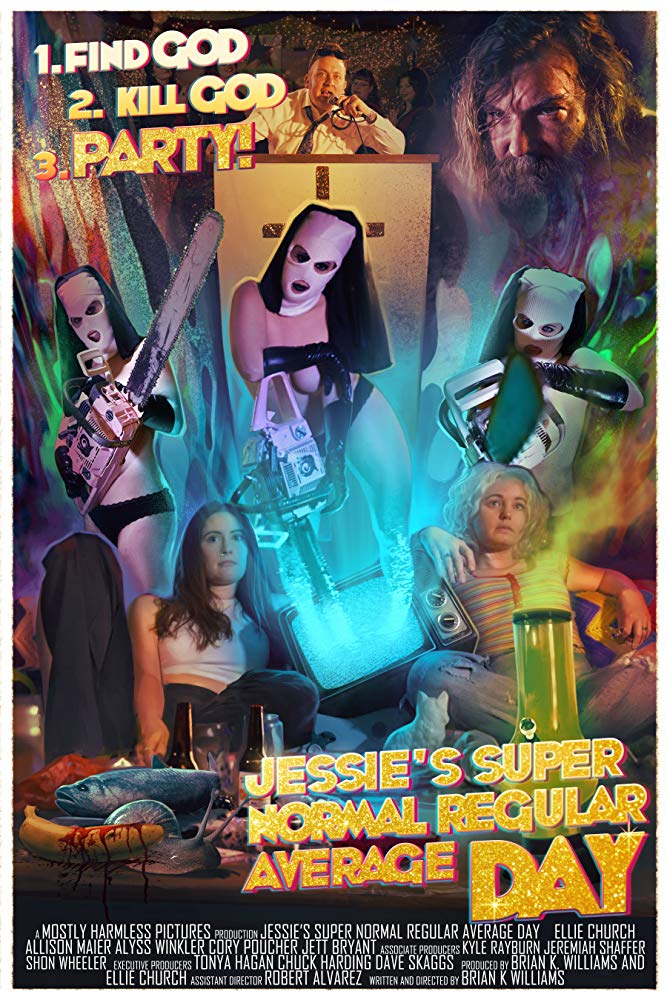
It’s sometimes said that, at heart, all filmmakers are basically trying to make the same film every time, but I doubt I’m alone in appreciating it when they appear to go in wildly diverging directions from film to film – even if, deep down, they may be addressing some of the same essential ideas. Jessie’s Super Normal Regular Average Day is the third film from American no-budget indie writer-director Brian K Williams, who has made a point of taking on notably distinct material every time thus far. His first feature, 2014’s Time To Kill, is a sleazy neo-grindhouse revenge movie, light on plot but heavy on violence, nudity and druggy atmospherics; by contrast, his follow-up – 2017’s Space Babes From Outer Space – is a goofy sci-fi sex comedy in the vein of the early 90s straight-to-VHS era. (Between the two, Williams and his recurring lead actress/wife Ellie Church collaborated with Scott Schirmer on 2016’s Harvest Lake and Plank Face.)
We might broadly surmise that sex, drugs and violence seem to be Williams’ key areas of interest; so if his first movie was primarily violence and his second primarily sex, his third is obviously the drugs movie, centring as it does on a day in the life of a layabout stoner. However, it’s apparent early on that Williams and company are not interested in just flinging out a bog standard Cheech and Chong/Jay and Silent Bob/Dude, Where’s My Car rehash (pun quite clearly intended). What we have here is, essentially, a zen koan wrapped in a stoner comedy; a haphazard, hemp-scented rumination on the true nature of the self, life, the universe, and everything. (Did I mention the film company’s called Mostly Harmless?)

Ellie Church is the titular Jessie. We’re basically told nothing about who she is or what she does, other than that she lives in a garishly decorated apartment with her best friend Misty (Allison Maier, also of Space Babes From Outer Space), and that on the day in question she appears to have no plans beyond eating some pancakes, watching some TV, and smoking a whole bunch of weed. However, once her channel-surfing leads her to a raving televangelist who appears to be addressing her directly, Jessie’s day starts to take a turn for the weirder, even without her stepping any further than her front doormat. Huge, hard to fathom questions start popping up about herself and the world around her, and Jessie quickly realises – in what is destined (and clearly intended) to be the film’s stand-out catchphrase – she’s way too not-high-enough for this shit.
The joy of so much exploitation cinema is how it makes a point of giving the audience the lurid stuff they paid to see, and then takes them by surprise with a bunch of political, ethical and/or philosophical-type stuff (not that politics or ethics are so much on the table here). Williams clearly understands this, having largely built his career thus far on trashy excess and T&A, hence he makes a point of including some ultra-gratuitous nudity early on (it’s interesting to note how often that’s the case in no-budget indie genre films; they tend to throw in the skin shots early to grab the attention of viewers, and oftentimes distributors, right away). And of course, there’s also the matter of the topless nuns with chainsaws; all three of whom are played, via the magic of green screen, by fellow Space Babes alumnus Alyss Winkler. No self-respecting exploitation aficionado is going to turn a blind eye to a wimple/ski mask/chainsaw/bare breasts combo, so doubtless plenty of viewers will pick up the film on the strength of this alone. And once the movie has your attention with the wimples, tits and chainsaws, that’s when it tries to claw its way into your brain.
Like I said, though, it’s not tits but drugs which are the primary focal point here, and I would caution that any viewer who likes to play that ‘match the character substance-for-substance’ game would be putting themselves at serious risk of hospitalisation trying to keep up with Church’s Jessie. We probably ought to note that it’s comparatively rare that women are cast as the compulsive stoner whose solution to any problem is to get utterly wasted; certainly Church is more than up to the task, and while this is one of her few roles to date that doesn’t in some way involve screaming bloody violence and torture, she proves highly endearing and relatable in this more sedate (or should that be sedated?) role.

Sure, we might award the film progressive points for giving us a female lead in a male-dominated subgenre, but again, politics are really not the issue here. Rather, the film is preoccupied with abstract ideas about the whole human experience, and of course, many of us feel best equipped to handle such contemplation whilst under the influence. As such, the film is written, shot, edited, designed and scored in such a way as to be in tune with a drug-addled mind; being a child of the 1990s doesn’t hurt either (if you don’t have a liking for ska punk or hip hop, you may not get along with it all too well).
Still, this is not to say you need to be good and loaded to appreciate Jessie’s Super Normal Regular Average Day (for what it’s worth, I wasn’t). You’re almost certainly less likely to engage with it if you don’t have a liking of the classic stoner comedy sensibility, but ultimately this is a film that’s less interested in making you giggle at stupid shit than it is with getting you to ponder the big mysteries. As ridiculous as the whole endeavour might seem, Williams has stated that it’s his most personal work yet, and it’s not hard to see why given the questions it posits, and the conclusions – however vague – it seems to reach. And while there are doubtless plenty of viewers liable to complain that when all’s said and done none of it makes a lick of sense, I’d refer you back to my earlier note that this is essentially a zen koan; and the real secret about those which a lot of people don’t want to tell you is, the fact that they don’t make any damn sense is entirely the point. That’s life; and that’s Jessie’s Super Normal Regular Average Day. Enjoy both.
Jessie’s Super Normal Regular Average Day is available on limited edition Blu-Ray here; like their Facebook page for more information.
